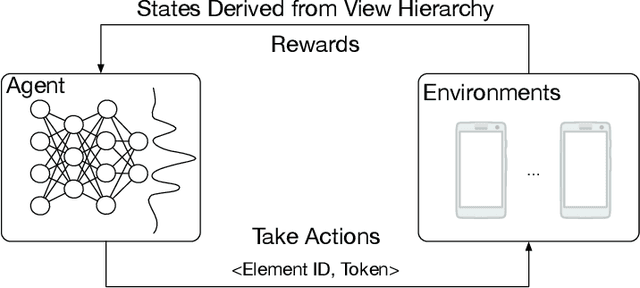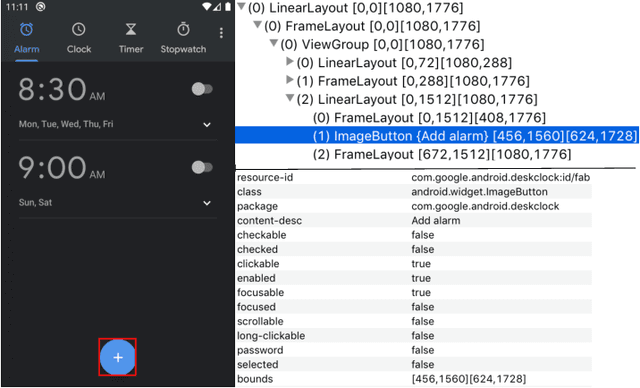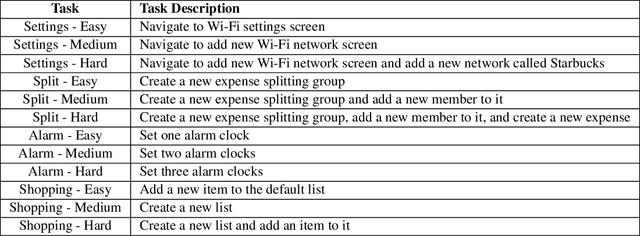Maayan Shvo
AppBuddy: Learning to Accomplish Tasks in Mobile Apps via Reinforcement Learning
Jun 06, 2021



Abstract:Human beings, even small children, quickly become adept at figuring out how to use applications on their mobile devices. Learning to use a new app is often achieved via trial-and-error, accelerated by transfer of knowledge from past experiences with like apps. The prospect of building a smarter smartphone - one that can learn how to achieve tasks using mobile apps - is tantalizing. In this paper we explore the use of Reinforcement Learning (RL) with the goal of advancing this aspiration. We introduce an RL-based framework for learning to accomplish tasks in mobile apps. RL agents are provided with states derived from the underlying representation of on-screen elements, and rewards that are based on progress made in the task. Agents can interact with screen elements by tapping or typing. Our experimental results, over a number of mobile apps, show that RL agents can learn to accomplish multi-step tasks, as well as achieve modest generalization across different apps. More generally, we develop a platform which addresses several engineering challenges to enable an effective RL training environment. Our AppBuddy platform is compatible with OpenAI Gym and includes a suite of mobile apps and benchmark tasks that supports a diversity of RL research in the mobile app setting.
Interpretable Sequence Classification via Discrete Optimization
Oct 06, 2020



Abstract:Sequence classification is the task of predicting a class label given a sequence of observations. In many applications such as healthcare monitoring or intrusion detection, early classification is crucial to prompt intervention. In this work, we learn sequence classifiers that favour early classification from an evolving observation trace. While many state-of-the-art sequence classifiers are neural networks, and in particular LSTMs, our classifiers take the form of finite state automata and are learned via discrete optimization. Our automata-based classifiers are interpretable---supporting explanation, counterfactual reasoning, and human-in-the-loop modification---and have strong empirical performance. Experiments over a suite of goal recognition and behaviour classification datasets show our learned automata-based classifiers to have comparable test performance to LSTM-based classifiers, with the added advantage of being interpretable.
Towards the Role of Theory of Mind in Explanation
May 06, 2020Abstract:Theory of Mind is commonly defined as the ability to attribute mental states (e.g., beliefs, goals) to oneself, and to others. A large body of previous work - from the social sciences to artificial intelligence - has observed that Theory of Mind capabilities are central to providing an explanation to another agent or when explaining that agent's behaviour. In this paper, we build and expand upon previous work by providing an account of explanation in terms of the beliefs of agents and the mechanism by which agents revise their beliefs given possible explanations. We further identify a set of desiderata for explanations that utilize Theory of Mind. These desiderata inform our belief-based account of explanation.
Towards Empathetic Planning
Jun 14, 2019Abstract:Critical to successful human interaction is a capacity for empathy - the ability to understand and share the thoughts and feelings of another. As Artificial Intelligence (AI) systems are increasingly required to interact with humans in a myriad of settings, it is important to enable AI to wield empathy as a tool to benefit those it interacts with. In this paper, we work towards this goal by bringing together a number of important concepts: empathy, AI planning, and reasoning in the presence of knowledge and belief. We formalize the notion of Empathetic Planning which is informed by the beliefs and affective state of the empathizee. We appeal to an epistemic logic framework to represent the beliefs of the empathizee and propose AI planning-based computational approaches to compute empathetic solutions. We illustrate the potential benefits of our approach by conducting a study where we evaluate participants' perceptions of the agent's empathetic abilities and assistive capabilities.
 Add to Chrome
Add to Chrome Add to Firefox
Add to Firefox Add to Edge
Add to Edge